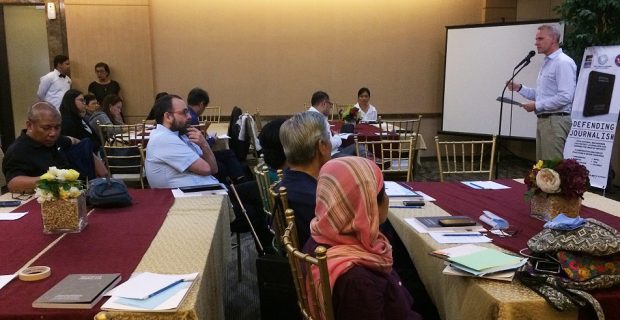CHR: Democracy needs a free press
The Commission on Human Rights (CHR) underscored the role of a free press in a democracy, even as it noted the Philippines’ steady decline in the World Press Freedom Index in the last four years.
In her keynote message for a journalists and human rights defenders’ project Friday, May 28, CHR executive director Jacqueline Ann de Guia said democracy needs a free press to thrive and survive.
“It is the power of a free and independent media—to be a watchdog, to promote transparency and accountability, and to amplify the voices of the weak, disadvantaged, and marginalized—that put pressure on government to be responsive to the needs of the people,” de Guia said.
De Guia however expressed alarm at the state of press freedom in the country, adding that international group Reporters Without Borders has noted continuing attacks against mass media, journalists and other human rights defenders in the past four years.
“The state of press freedom in the country is a cause for concern for CHR. In the past four years, data from the World Press Freedom Index shows a continuous decline of the Philippines from 133rd out of 180 countries in 2018; to 134th in 2019; 136th in 2020; and 138th in 2021,” de Guia said.
De Guia spoke at the project launch of Safeguarding Journalists and Human Rights Defenders in the Philippines by various media groups led by the Asian Institute of Journalism and Communication and the International Media Service.
Other attendees included members of the Journalists Safety Advisory Group (JSAG) that crafted the Philippine Plan of Action for the Safety of Journalists (PPASJ) last November 2019 on the occasion of the 10th anniversary of the Ampatuan Massacre.
The JSAG included the National Union of Journalists of the Philippines, Center for Media Freedom and Responsibility, Center for Community Journalism and Development, and the Philippine Press Institute.

In her address, de Guia said the press must maintain its ability to expose corruption, demand redress of grievances, and call out lies and propaganda in favor of truth.
She added that the press must equally allow the people to decide better and demand more from the government that bears the obligation to uphold and protect the human rights of all.
The last four years have seen journalists, media workers, and media organisations being repeatedly confronted by a dangerous and hostile climate marked by episodes of harassment, silencing, and even death.
“And with the closure of ABS-CBN, we have greatly felt the gap in delivering critical information in hard-to-reach communities to help them cope and survive disasters, calamities, and this current Covid-19 pandemic,” she said.
De Guia said that the CHR’s Task Force on Media-Related EJKs (extrajudicial killings), with regional desks in its Bicol, Cotabato and Cebu regional offices, is ready to investigate attacks against the press.
“Thus far, 21 media killings have been docketed for investigation in different CHR regional offices covering July 2016 to May 2021. We are also investigating 7 cases involving 20 victims of other alleged human rights violations, including unlawful/arbitrary arrest/detention, frustrated killings, and red-tagging,” she said. # (Raymund B. Villanueva)

